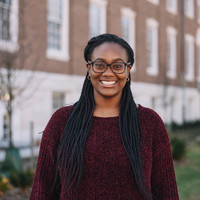Oluwadamilola Oshewa
Item
-
Title
-
Oluwadamilola Oshewa
-
Description
-
You mentioned your Nigerian identity and American identity. How do you balance those two things?
“Sometimes it almost feels like I’m not American enough or I’m not Nigerian enough. Like I've said, I haven’t been back to Nigeria in a very long time, but then I meet people who grew up in Nigeria their whole life and my experience being Nigerian is very different even though I still identify that way. But to me, that doesn’t make me any less Nigerian than their experiences having grown up and gone to school there, and now immigrating to the States for college. So I think that’s something that I’ve had to learn to balance. I do take pride in being Nigerian, but I also recognize that I grew up in the States. I’ve had a different experience from people who we refer to as ‘fresh off the boat.’ So I definitely think I recognized that even though I have a different identity, all of our experiences as Nigerian Americans are valid and real, and no one is more or less than the other. And the same thing goes for being American. Even though I had a different experience from people who don’t have a connection to a country abroad, I still have the American experience, and I’m still an American citizen. I’m still entitled to the same rights and privileges as other Americans in this country even though I’m from a country and a continent that can be seen as or perceived as less than by many people here in the States.”
From your perspective, what are some things that we can do to change the current conversation on immigration?
“Taking action. I’m part of the Black Student Union’s executive board and we are a politically based organization that fights for the rights of black Americans, particularly black students on this campus. So joining an organization like that - one that takes political action, that protests, that organizes so your voice can be heard - I think that’s one way. I know for some people, protests and marches aren’t their thing. And I would say in your personal interactions with others, if you hear something that sounds misinformed or uneducated, don’t be afraid to say something or call someone out on that. You need a lot more of that nowadays because I see a lot of people with friends who are widely misinformed and prejudiced and none of their friends will say anything about it. They’ll come talk to me and say, ‘I had this really uncomfortable conversation with so-and-so,’ and I’m like, ‘So what did you do?’ and they didn’t do anything. So I would say in those types of instances, say something. Make sure you know that those people know what they said was uninformed, or can hurt people. I think that’s helpful because those comments can hurt, coming from people who don’t identify as that group.”
 Oluwadamilola Oshewa
Oluwadamilola Oshewa